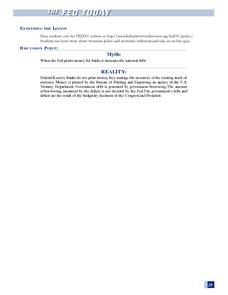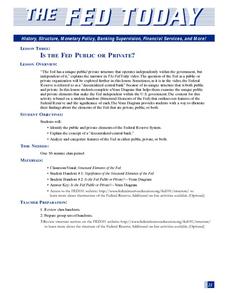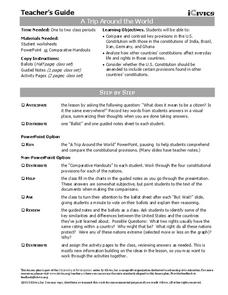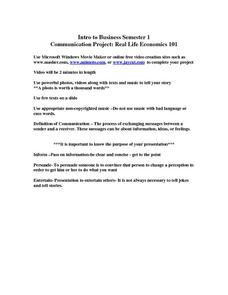Student Handouts
Budgets and Deficits
There's a lot to learn about the savings and loan crisis. Start off your learners with a quick reading assignment. Pupils read the brief informational article and respond to three questions about the savings and loan crisis, thrifts, and...
Federal Reserve Bank
The Fed - Helping Keep Banks Safe and Sound
What does an examiner look for when analyzing a bank's financial condition? In addition to learning about the 5-Cs for reviewing loans and CAMELS (capital, assets, management, earnings, liquidity, and sensitivity to risk), your learners...
Federal Reserve Bank
The Fed Is Protecting Your Money
A dollar bill, a check, a credit card, and... a cow? What exactly are the various forms of payment that exist today? Your learners will identify the three functions of money in this lesson. In addition, they will discover the most common...
Federal Reserve Bank
The Fed's Role in Making and Setting Monetary Policy: Part 2
How does the Federal Open Market Committee work to formulate the nation's monetary policy in the United States? As the second segment of a lesson on the role of the Fed in setting monetary policy, class members will learn about open...
Federal Reserve Bank
The Fed's Role in Making and Setting Monetary Policy: Part 1
How does inflation affect the economy, and how can effective monetary policy by the Federal Reserve help control inflation? With the Fisher equation and analysis of annual CPI rates during the 1970s and early 1980s, your class members...
Federal Reserve Bank
Is the Fed Public or Private?
The Federal Reserve System as a decentralized central bank can be a difficult concept for learners to grasp. Help them get a firm handle on this concept using this resource, in which class members work as a group to identify the...
Center for Civic Education
The Power of Nonviolence: Change Through Strategic Nonviolent Action
How did major historical figures, such as Henry David Thoreau, Susan B. Anthony, and Mohandas K. Gandhi, explain and defend their beliefs in nonviolence? Your learners will begin by studying the backgrounds of these individuals, and then...
Center for Civic Education
The Power of Nonviolence: What Is Nonviolence? What Does It Cost?
Your young learners will delve into the language of primary source documents in order to identify the characteristics, benefits, and costs of nonviolence. The lesson includes a mix of activities, including an anticipatory activity,...
iCivics
Emphasize Minimize
Encourage your class members to consider what points they are really emphasizing when they are making an argument, whether in writing or in speech. Watch out though, as this lesson may just leave your learners eager to debate you!
iCivics
Yeah, But...
Impress upon your young learners the importance of formulating counter arguments based on facts and not opinions. This resource is meant to strengthen arguments designed in a previous lesson, but could also be used as a stand-alone...
iCivics
A Trip Around the World
How do the rights of citizens in other countries, such as India, Germany, Brazil, and Iran, compare to those of Americans? Take a closer look at the provisions of various foreign constitutions, and compare and contrast the protections...
iCivics
Government Spending
After discussing personal financing with your class, consider following up with this well-rounded introduction to government spending. The resource includes reading documents and worksheets, and covers topics as the federal deficit and...
iCivics
Congress
Through reading materials, worksheets, and a primary source activity, this resource provides an overview of the structure and powers of the legislative branch of government in the United States. Readings review how a bill becomes a law,...
iCivics
You've Got Rights!
If aliens invaders nearly destroy the world in the distant future and leaders must decide on a pamphlet of protections to preserve individual rights, what should they include? Introduce the Bill of Rights and the struggle between the...
Canadian Museum of Civilization Corporation
Propaganda Posters
Don't be put off by the fact that the World War I propaganda posters in this packet are Canadian and some of them are even in French. All the better, in fact, to see the techniques. The richly detailed plan has instructors model...
University of Arkansas
Promises Denied
"Promises Denied," the second instructional activity in a unit that asks learners to consider the responsibilities individuals have to uphold human rights, looks at documents that illustrate the difficulty the US has had trying to live...
Sharp School
Real Life Economics 101
Your learners will take key economic concepts, such as identifying needs versus wants and the four factors of production, and design a video to explain their topic choice to the class. Rather than have one person in charge of dispensing...
iCivics
The "Federal" in Federalism
How are states in the United States related to each other? Does the government bind them together? Do states have different governments? After reading about federal power as a whole group, your class members will participate in a...
iCivics
Wanted: A Just Right Government
What type of government did American colonists gain and seek after gaining their independence after the Revolutionary War? Here is activity that will guide your young learners through the new nation's progression from the Articles of...
iCivics
Why Government?
Why do people create governments? Where did we get our ideas about government? This is a fantastic introductory lesson plan for your American government class that begins by reviewing the philosophies of Thomas Hobbes and John Locke in...
Weebly
Holocaust Diary Project
Here is a good interdisciplinary project that combines creative and narrative writing with studies of the Holocaust. Your young historians will compose a diary of experiences from the perspective of an individual living during the time...
Weebly
Infographic Project
This multi-faceted, progressive project includes an array of activities for analyzing and evaluating a theme of American history. Learners begin by constructing a timeline of events in United States history using Google docs, create a...
Weebly
Nationalism Project
Don't just ask your class to define nationalism, but invite them to experience it with an engaging project. Learners are divided into groups to design four items—a flag, slogan, national anthem, and historical tale—for a fictional...
US National Archives
Documented Rights Educational Lesson Plan
How have groups struggled to have their unalienable rights recognized in the United States? Acting as a research team for the Human Rights Council of the United Nations, your young historians will break into groups to research how people...

























